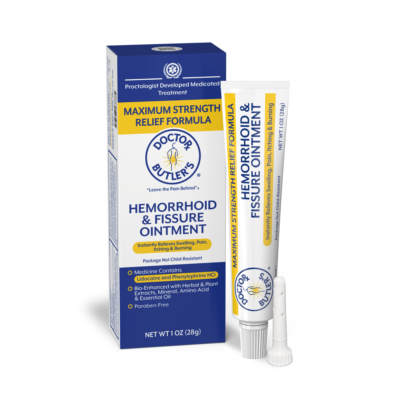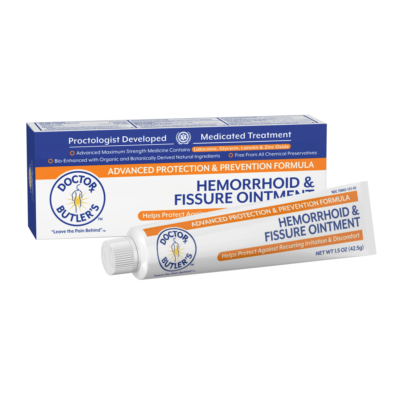When it feels like your body is always working against you instead of with you, getting your nutrition right may feel like a far away goal.
The truth is, it can actually be really easy to make the switch to a healthier diet. Take a few minutes to read up on why you should consider swapping out whole wheat bread and oat bran for white bread and sugary cereal, why you should leave fruit skins in place instead of peeling them off, and more suggestions for incorporating fiber-rich foods in your diet. Your body will be better off for it!
This post is about the best diet for hemorrhoid sufferers and what foods can trigger hemorrhoids. As a proctologist in practice for more than 30 years, Dr. Robert Cutler has made these food and nutrition recommendations to thousands of patients. For most, it was crucial to the management of their hemorrhoid flare ups and reduced their pain significantly.
Read on to learn about hemorrhoids and then continue on for tips on a diet best suited to prevent symptomatic hemorrhoids.
Who are we? We’re Doctor Butler’s, experts in down-there care of hemorrhoids and related conditions. We make proctologist-developed hemorrhoid ointments and complementary products to help you quickly leave the pain behind. Dr. Robert Cutler medically reviews all of the information here.
Originally published on July 29th, 2021, this article has been updated to include specific foods that irritate hemorrhoids.
What Are Hemorrhoids?
Hemorrhoids are groups of veins along the rectum wall that can cause pain, itching, or other irritating symptoms when inflamed due to increased sensitivity in the region. A swollen hemorrhoid is likely the result of excess straining on the toilet (from poor diet, diarrhea or constipation) or pressure from pregnancy or physical activity.
Typical hemorrhoid symptoms include itching, burning, bleeding, increased sensitivity and pain, and mucous secretions. Inflamed hemorrhoid symptoms range anywhere from mildly unpleasant to seriously painful, and symptoms can worsen if swollen hemorrhoids go untreated as subsequent bowel movements rub against the inflamed skin.
Hemorrhoids are either ‘internal’ or ‘external’. If you have symptomatic internal hemorrhoids, you’ll likely only notice them as they bleed onto your toilet tissue after a bowel movement. They are located on the inside of the anus. These internal hemorrhoids are not typically painful, though they sometimes prolapse and fall outside of the anus where they’re more susceptible to irritation.
External hemorrhoids perch on the rim of the anus or further out. This kind of hemorrhoid is frequently irritated when it’s wiped with rough toilet paper and the skin is damaged. These hemorrhoids can be seen with a hand mirror, will look like a miniature cluster of grapes, and will likely be sensitive to the touch.
Pain ease
No burning . . stays put good solid product for easing pain of private area.
Verified ReviewerTo prevent hemorrhoids from forming in the first place, there are a few things you should work on.
What Are The Main Causes of Hemorrhoids?
Smooth bowel movements make for a happy colon. Bowel movements where you’re straining, pushing a lot, and sitting for long periods can cause or make hemorrhoids worse. In fact, any activity where you’re building pressure in the anal region (like weightlifting or delivering a child) will make the veins down there susceptible to swelling.
But today, we’re focused on promoting healthy bowel movements. To do that, you need to make sure you’re eating the right diet for hemorrhoid sufferers and avoiding foods that cause constipation or frequent trips to the toilet.
For example, high sodium foods typically found in highly processed foods at restaurants and fast food joints contribute to an unhealthy diet and constipation. And while it’s possible to have these foods in moderation, eating them constantly is an issue because it introduces so much salt (not to mention fat, sugar, etc.) into your body that it starts to cause dehydration in your digestive system.
There are other diet no-go’s for hemorrhoid sufferers that we are going to discuss below, but this point should be emphasized: while we have incredibly resilient bodies, we still need to treat it right to optimize our health and well-being with one of those things being a balanced diet. This next section will provide practical tips on eating healthy if you’re dealing with a hemorrhoid flare up right now.
The Best Diet for Hemorrhoid Sufferers
The right diet for hemorrhoids has four key components: high fiber, low fat, whole grains, and staying hydrated.
1. Fill Up with Fiber-Rich Foods
Fiber helps with hemorrhoids because it regulates bowel movements and increases the amount of water in your stools, making them easier to pass. Fiber has other benefits too, like making it less likely that bleeding will occur in the case of internal hemorrhoids, according to one clinical study.
Before loading up on flax seeds though, you need to know that fiber comes in two forms, soluble and insoluble, and they work in different ways. Most foods feature both kinds of fiber in varying quantities, and unless you’re recommended by a doctor to stick to one or the other, it’s generally good to eat a mix of the two.
A high proportion of soluble fiber is found in foods like pinto beans, kidney beans, the meat of an apple, cooked artichoke, and in psyllium, usually found in cereals. If you’ve ever cooked oatmeal, you’ve likely noticed how it thickens; that is what soluble fiber does. It thickens as it dissolves in water and turns into a gel that aids in digestion by increasing the bulk of your stool.
This makes soluble fibers useful for fighting diarrhea. One 1993 study (referenced here in the latest DRI report on Energy, Carbohydrate, Fiber, Fat, Fatty Acids, Cholesterol, Protein, and Amino Acids) showed that the weight of stools increased 5.4 grams for every one gram of wheat bran fiber consumed.
Insoluble fiber, on the other hand, promotes regularity by attracting and absorbing water, softening the stool and helping it to pass through your digestive tract. This is why insoluble fiber specifically is good to have when constipated. Whole grains such as quinoa, whole wheat bread and brown rice, vegetables such as parsnips and corn, and the fruit skins like those on apples, pears, and blackberries are high in insoluble fiber.
Here is a well-laid out list containing common high fiber foods and their insoluble and soluble fiber contents. The list shows that many foods contain both kinds of fiber.
Because of the contrasting ways in which soluble and insoluble fiber interacts with water, you can say that insoluble fiber pushes digestion along while soluble fiber reigns it in. This short video from the gastro experts at New York-Presbyterian Hospital is a good overview if you’re still a bit confused about soluble vs. insoluble fiber.
The official Dietary Guidelines for Americans suggests 14 grams of fiber for every 1000 calories you consume, which comes to about 38g/day for men and 25g/day for women 19-50 years old. Women over 51 should get 21g/day and men should get 31g/day. Most Americans only eat about 15g/day, much lower than the recommended amount.
Fiber is found in low quantities in the highly processed foods, as we’ll now discuss.
2. Avoid Processed Foods That Cause Constipation
The reason to avoid lots of processed foods is because generally, their nutrient density is low and their energy density is high. This means they’re high in calories per gram and low in fiber per gram. When you eat these high calorie foods that are low in nutrient density, it takes more calories to get full and tends to result in overeating.
So while highly processed foods add bulk to your digestive tract, they do so without aiding in digestion and other essential bodily functions. Fatty, salty foods like potato chips or fried foods can lead to obesity, which is a catalyst for hemorrhoid flare ups due to the added weight you’re adding to the frame of your body and added pressure on your circulatory system.
So what exactly is processed food and what should you be looking out for?
Not all foods that are “processed” are necessarily bad for you. Pressing seeds to make oil is technically a “process”, and so is pasteurizing milk and making healthy cereals. But when a processed food is high in sodium for example, it can dehydrate your digestive system leading to hemorrhoid-causing constipation.
The key here is to read food labels and make sure that calorie and sodium content is low while fiber content is high. Many ingredients in the worst foods for you are there for purposes of shelf life and taste and not health. They use fat, sugar and sodium for flavoring so you need to be aware of how much fat is added so you don’t overindulge in your optimal daily caloric intake.
Switch out whole wheat bread for white bread if you’re constipated. The same goes for whole wheat pasta. And when searching the cereal aisle for breakfast, look for cereals made from 100 percent oat bran and no added sugar, or go with oatmeal and top it off with bananas, blueberries, or other fruits for a breakfast that’s better for your bowels.
3. Get Your Gut Health in Check
Keeping your gut healthy means eating nutritious foods to promote the growth of good bacteria, and to limit the growth of bad bacteria. A diet high in fat and sugar and low in fiber can kill certain gut bacterias, which kills off bacteria diversity and creates imbalances in your gut’s microbiome.
It’s theorized that a healthy microbiome helps regulate blood sugar levels, the immune system, and other bodily functions, and that gut bacteria imbalances are to blame for everything from inflammatory disorders to heart disease, kidney problems, autoimmune disorders, and more.
The worst foods for gut bacteria appear to be processed meats, sugary sweets, refined grains, and fast food, according to recent studies, which also propose that these foods increase your body’s sensitivity to inflammation which can be a major trigger for hemorrhoids.
In summary, experts recommend that a diet for hemorrhoid sufferers should be low in fat. Feed your gut bacteria nutritious foods to promote their growth. Good bacteria grows as it feeds on plant fibers from nuts, legumes, fruits, vegetables, and grains, and when good bacteria grows it actually stops bad bacterias from growing by physically taking space away from them.
4. Stay Hydrated
Water keeps your digestive system flowing. It was explained above how water interacts with the different kinds of fibers entering your body, and the obvious thing to note from this is that without water, the beneficial fiber you’re eating won’t work the way it should. Instead of fiber working with you, it will work against you, causing dehydration which complicates hemorrhoids further as it causes constipation.
The National Academy of Medicine recommends adult women to drink 91 ounces of water a day at minimum, and adult men to drink at least 125 ounces, where 128 ounces is one gallon of water. It’s suggested that drinking while eating a meal or a snack is actually helpful in maximizing hydration, rather than drinking high quantities of water between meals. This makes staying hydrated an essential part of any diet for hemorrhoid sufferers.
5. Limit Your Alcohol Consumption
This last suggestion, like the others above, clearly contributes to many areas of bodily health, though, as with most of life’s indulgences, there’s an unfortunate connection to hemorrhoids as well. Hemorrhoid patients are rarely told to stop drinking completely, but it is suggested to cut back to two drinks per day for men and one per day for women maximum.
This is because excessive alcohol has been shown to raise blood pressure and stress the circulatory system. This puts pressure on the veins and leads to hemorrhoids. Anything that affects the function of the liver can cause a buildup in pressure of the circulatory system in your body, which puts pressure on hemorrhoids and can cause them to swell up. For this reason, it’s advised to drink in moderation.
Foods to Avoid with Hemorrhoids
🌶️ aka: hold the hot sauce! 🌶️
Any foods that have the ability to scrape or irritate your hemorrhoids on the way out is a problem. Nuts, seeds, corn, and popcorn in your stool can physically scrape inflamed hemorrhoids as you go to the bathroom, so you want to avoid these when you’re experiencing a flare up.
You also want to avoid food that causes hemorrhoids to swell, which includes foods with spices like hot sauces, ketchup, mustard, pickles, relish, onion, garlic, and salami. Really, anything you’d normally want to put on a hot dog or a pizza should be avoided when you have an active hemorrhoid inflammation.
Additionally, you likely want to avoid cruciferous vegetables and gassy foods like broccoli, cauliflower, and cabbage. These foods are not necessarily a problem for people with hemorrhoids, but if you have abdominal disorders that trigger diarrhea or other problems that can lead to hemorrhoids, avoid these foods.
Here are specific foods that irritate hemorrhoids:
- Highly processed meats
- Dairy and cheese if you’re sensitive to these
- Nuts, seeds, corn, popcorn
- Spicy foods and hot sauces
- Pickles, relish, ketchup, mustard
- Onion, garlic
- Cabbage, cauliflower, broccoli if these make you gassy
Finding Pain Relief from Hemorrhoids
Nutrition can be overwhelming at first, especially if it’s been a while since you’ve needed to know how calories, sodium, fiber and more interact with your body and your gut. What’s a relief to know is that this kind of knowledge can be easily obtained, and that making healthy choices with your food habits doesn’t have to be hard.
All you have to do is read the nutrition facts of the food you’re buying from the grocery store and start to understand which kinds of foods are high in sodium, fat, and sugar, and thus bad for digestion and hemorrhoid flare ups in most cases. You want to look for foods that are a proportionally high source of fiber.
You will also, however, want to speak to your doctor if your issues are ongoing, whether these issues are hemorrhoids, diarrhea, or constipation. If you’re dealing with hemorrhoids and curious about over the counter treatments, contact us as we’re happy to go through our product line to find a good fit for your treatment needs.
🏅🏅🏅🏅🏅
🏅🏅🏅🏅🏅
Verified ReviewerWe make a high impact hemorrhoid cream with lidocaine, a well loved hemorrhoid spray, wipes, seat cushions and more. And be sure to check out related posts like our popular hemorrhoids high fiber diet blog.
All of our hemorrhoid solutions are formulated by Dr. Robert Cutler, a board certified proctologist who has seen patients for more than 30 years. He’s told thousands of hemorrhoid prone patients to eat fewer spicy foods, and would recommend it to anyone hoping to “Leave the Pain Behind”.


